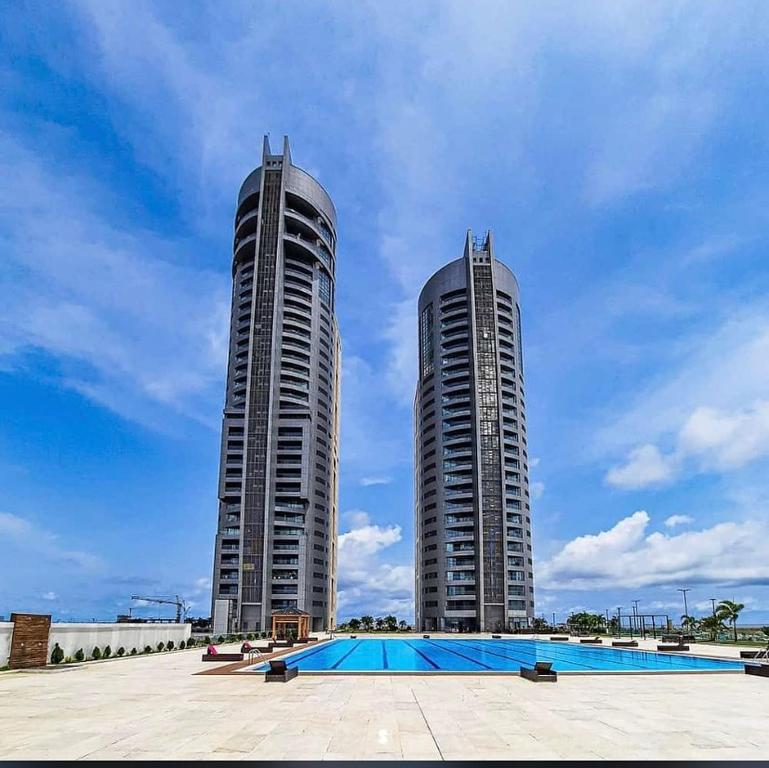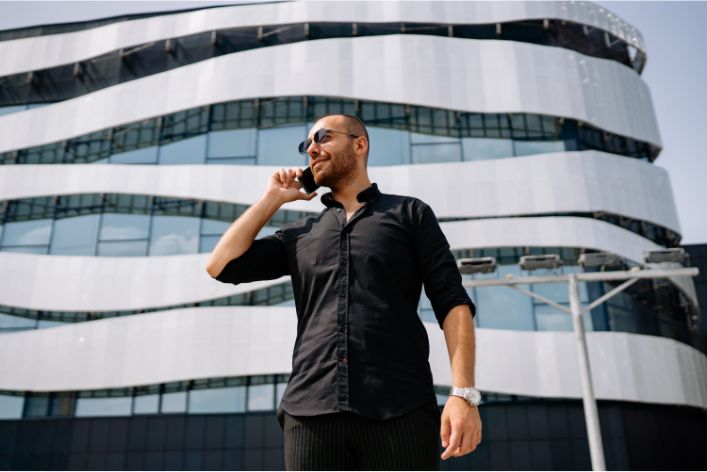Introduction
Real estate in Nigeria has been a topic of interest over the years. This blog post will discuss successful real estate projects in Nigeria that have made a huge impact. Such projects contribute to the country’s economic growth and development.
The construction of world-class real estate properties attracts foreign investors and enhances the living standards of Nigerians. Government involvement, financing options, location, cost, and technology play vital roles in the success of real estate projects in Nigeria.
This blog post offers insights and lessons from case studies to assist potential developers and investors. The first case study delves into the exceptional Lagos Eko Atlantic City Project developed on reclaimed land.
The Eko Atlantic City Project
The Eko Atlantic City Project is a remarkable real estate endeavor in Nigeria. It is situated adjacent to Lagos and serves as a man-made island meticulously crafted to tackle the persistent coastal erosion issues that have affected the region for years.
Overview of the project
- The project was initiated in 2006 by the Chagoury Group, a Nigerian-based company, in partnership with South Energyx Nigeria Limited.
- Eko Atlantic City is being built on an area of 10 square kilometers and is expected to house 250,000 people once completed.
- The city is designed to be self-sufficient, with sustainable energy solutions, waste management systems, and public transportation options.
- The real estate project has attracted investors from around the world, including China, the United States, and the United Kingdom.
- The first residential tower in the city, Eko Pearl Towers, was completed in 2018.
Success factors
- The project has made significant progress and is now over 60% complete, despite facing challenges such as legal disputes and funding constraints.
- The Eko Atlantic City project has been successful in attracting foreign investors to Nigeria, boosting the country’s economy and promoting foreign investment in the region.
- The development has provided employment opportunities for locals and helped to stimulate local businesses.
- The project has also attracted interest from Nigerian citizens who are looking for a modern, vibrant, and safe place to live.
- The Chagoury Group’s commitment to sustainable development has also contributed to the project’s success, promoting green initiatives such as solar energy and water conservation.
Impact on the Nigerian real estate industry
- The Eko Atlantic City project has set a new standard for real estate development in Nigeria, providing a blueprint for future projects.
- The success of the project has also helped to boost the reputation of the Nigerian real estate industry, which has traditionally been hindered by issues such as corruption and legal disputes.
- The project has encouraged other real estate developers to invest in similar projects, increasing competition in the industry and providing more options for Nigerian citizens looking for high-quality housing solutions.
- The development has also helped to address the country’s housing deficit, which has been estimated at over 17 million units.
The Eko Atlantic City Project stands as a successful real estate venture in Nigeria, showcasing innovative design, sustainability, and foreign investment. It has enhanced the country’s real estate industry, addressing housing needs and providing quality housing solutions.
Read: Corporate Law in Nigeria: Opportunities and Challenges

The Maryland Mall Project
The Maryland Mall Project, situated in Lagos’ suburb of Maryland, is a highly successful real estate venture that has garnered significant attention.
As one of Nigeria’s prominent retail centers, it stands out for its remarkable achievements since its completion.
Overview of the project
The Maryland Mall Project was developed by Purple Capital Partners in partnership with Actis, and it took approximately four years to complete.
The mall covers an area of 23,000 square meters and has a total leasable space of 13,500 square meters.
Also, the mall has four floors that house over 50 national and international retail brands, including Shoprite, Samsung, and Swatch, among others.
What’s more the mall also has a food court, cinema, and a children’s play area, making it a one-stop destination for entertainment, food, and shopping.
Read: How to Become a Licensed Real Estate Agent in Nigeria
Success factors
One of the key success factors of the Maryland Mall Project is its strategic location. The mall is also located near major landmarks, such as the Maryland Interchange, which is a major transportation hub in Lagos.
The mall’s modern design and state-of-the-art facilities have also contributed to its success.The mall also has ample parking space, which can accommodate up to 600 cars at a time.
The Maryland Mall Project’s management team has also played a significant role in its success. The team has implemented effective marketing strategies and has worked tirelessly to attract and retain tenants.
The mall’s management team has also fostered good relationships with tenants, which has helped to reduce tenant turnover and maintain a high occupancy rate.
Impact on the Nigerian retail industry
The Maryland Mall Project has transformed the Nigerian retail industry, attracting local and international brands, boosting the sector.
It has spurred more retail investments and created opportunities for local businesses, artisans, and food vendors. It serves as a testament to the potential of Nigeria’s real estate industry in driving economic growth.
Read: Nigeria’s Fight Against Corruption: Law’s Critical Role
The Haven Homes Project
The Haven Homes Project is one of the most successful real estate projects in Nigeria. The project was designed with the aim of providing luxury living experiences in Lagos for Nigerians and foreigners.
Overview of the Project
- The Haven Homes Project is a luxury real estate development located in Lagos, Nigeria.
- The project consists of 42 units of high-end residential apartments and townhouses.
- The development features premium quality finishes and state-of-the-art amenities such as a swimming pool, gym, and rooftop terrace.
- The project was completed in 2015, and all units were sold within six months of completion.
Success Factors
- The Haven Homes Project was successful due to several key factors. One of the most significant factors was the location of the development.
Lagos is a prime destination for real estate investment in Nigeria, and the project’s location in the upscale Ikoyi neighborhood made it highly attractive to investors. - The project’s focus on providing high-quality finishes and amenities also contributed to its success. The developers ensured that every unit was finished to perfection, with top-of-the-line fittings and fixtures.
- The developers also employed a strategic marketing campaign, which targeted high net worth individuals, both locally and internationally.
- Additionally, the developers partnered with leading financial institutions to provide flexible payment plans, which made it easier for buyers to acquire units in the development.
Impact on the Nigerian Luxury Real Estate Market
- The Haven Homes Project had a significant impact on the Nigerian luxury real estate market.
- The development set a new standard for luxury living in Lagos, and it paved the way for several other high-end projects throughout the city.
- The project also attracted foreign investment into the Nigerian real estate sector. International buyers were drawn to the quality of the development and the potential for high returns on investment.
- The Haven Homes Project demonstrated that there was a growing demand for luxury real estate in Nigeria, and it paved the way for the development of several other successful projects.
The Haven Homes Project is a thriving real estate venture in Lagos, making a mark in the luxury market. Its success stems from high-quality finishes, strategic marketing, and partnerships with financial institutions. It showcased the demand for upscale properties in Lagos, inspiring other successful luxury project.
Read: Intellectual Property Rights Law in Nigeria Explained
Novare Gateway Mall Project
The Novare Gateway Mall project is an extremely successful real estate venture in Nigeria is situated in Lugbe, Abuja.
Spanning 12,500 square meters, the mall comprises a retail and commercial space housing more than 50 shops.
It boasts prominent anchor tenants like Shoprite, Game, and Genesis Deluxe Cinemas, further enhancing its appeal and popularity.
- Location: The choice of the location is key. The mall is sited in the heart of Abuja’s Lugbe district, which boasts of an influx of people from different parts of the city.
- Design: The mall’s unique design is customer-centric, with wide walkways, expansive parking space, and thoughtful consideration given to ease of access and shopping convenience.
- Anchor tenants: The presence of anchor tenants such as Shoprite, Game, and Genesis Deluxe Cinemas provides a draw for customers, thereby increasing foot traffic and sales for smaller businesses within the mall.
- Marketing Strategy: The mall management executed a top-notch marketing strategy that utilized a mix of traditional and digital media. The result was a high awareness of the mall’s opening that boosted the mall’s sales.
- Operational excellence: The mall’s management team prioritized customer satisfaction by adopting a customer-friendly approach to oversee its operations.
The Novare Gateway Mall has set a benchmark for modern retail and commercial spaces in Nigeria. Its success story serves as a valuable lesson for other real estate companies.
The mall’s significant impact on the Nigerian retail industry demonstrates the immense potential of real estate investments in Nigeria.
Read: Role of Technology in Nigeria’s Construction Sector
Conclusion
Nigeria’s real estate sector has notably boosted the country’s economic growth through successful projects.
These include Lagos’ Eko Atlantic City Project and Propertymart’s Jubilee Estate, as well as the Millard Fuller Foundation Project in Delta State.
Each project has opened avenues for investment and created jobs for Nigeria’s large population. The sector’s importance to Nigeria’s economy demands continued real estate investment.
The government must establish policies encouraging such investments.
Stakeholders must unite to ensure sustainable, affordable housing projects. Given proper investment, the real estate sector promises significant economic contributions in the future.




